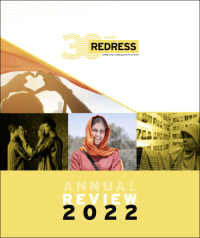Publications
REDRESS’ publications are also available in hard copy format. Please contact us for further information on [email protected].
On 13 May 2022, the African Commission on Human and Peoples’ Rights (ACHPR) adopted the Guidelines on Enforced Disappearances in Africa (EDA Guidelines) at its 71st Ordinary Session in Banjul, The Gambia. This Q&A addresses the key concepts and terminology, the main contexts in which enforced disappearance (ED) happens in Africa, the rights infringed upon by this crime, the main obstacles faced by victims seeking justice, and the States’ obligations.
This Annual Review provides an overview of the activities and achievements carried out by REDRESS from April 2021 to March 2022, with coverage of developments up until the date of printing in select areas. Among our successes this year is the release of British-Iranian hostage Nazanin Zaghari-Ratcliffe, for which REDRESS campaigned for six years alongside her husband Richard, and a new initiative to repurpose assets from perpetrators of torture for victims. We also continued to work for justice of survivors of torture in the UK and elsewhere, including through a ground-breaking decision on the torture of a female human rights defender in Libya.
REDRESS and the Centre for the Development of People (CEDEP) made this submission to draw the Committee against Torture’s attention to the issue of discriminatory violence affecting individuals identifying or perceived as LGBTIQ+ in Malawi. This submission is based on our extensive experience working against torture and on LGBTIQ+ issues in Malawi.
This briefing reviews four laws in Italy, Canada, Switzerland, and France, which enable the freezing, seizing, confiscation and/or repurposing of assets of perpetrators for the benefit of victims.
This briefing highlights the urgent need for legal reforms in Sudan prohibiting the use of information tainted by torture in any judicial proceedings, as required by article 15 of the Convention against Torture. The briefing also shows that many cases move through Sudanese courts in which allegations of torture have been raised by defendants, including in ongoing proceedings against four men accused of killing a police brigadier general during protests that took place in January 2022.
This report provides information on REDRESS’s activities from 1 April 2021 to 31 March 2022, including a review of our impact and activities, governance and management, and a financial review; an Independent Auditors Report, with their opinion on the accounts of the charity for the financial year, and a Statement of Financial Activities, with a detailed review of our finances for the year.
This report from REDRESS, Kdei Karuna and Global Survivors Fund’s (GSF), examines the scope and prevalence of CRSV during the Khmer Rouge regime and the main obstacles that survivors face in realising their right to reparations. It also explores what survivors’ would like in regards to effective reparation programmes. Finally, the study draws conclusions and explores the steps that the Cambodian authorities, civil society and the international community could take to help survivors in their search for redress. The study draws from consultations with survivors in-country, with experts and stakeholders, and desk research. This report is part of a multi-country study led by the GSF to fill the gap that exists around the world to honour the right of reparations for survivors of CRSV.
This bulletin highlights some of our success stories in the last four months. This includes the release of British-Iranian hostage Nazanin Zaghari-Ratliffe in March, after six years of arbitrary detention in Iran, and for which REDRESS successfully campaigned, along with her husband Richard Ratcliffe. In an interview in this Bulletin, Richard reflects on which changes are needed to avoid that what happened to Nazanin does not happen to others. The bulletin also covers two new reports. For Whose Justice we asked survivors of torture and their family members what justice meant to them in practice, why it was important, and what were their key barriers to achieving justice within the UK. Our report UNEQUAL Justice highlights the problem of discriminatory torture against LGBTIQ+ persons in Africa and suggests reforms to improve accountability.






